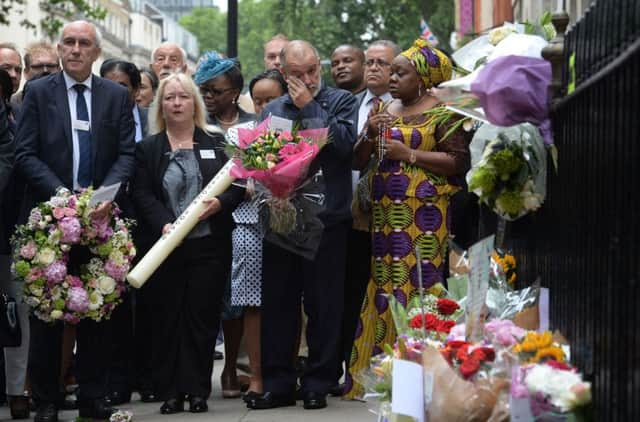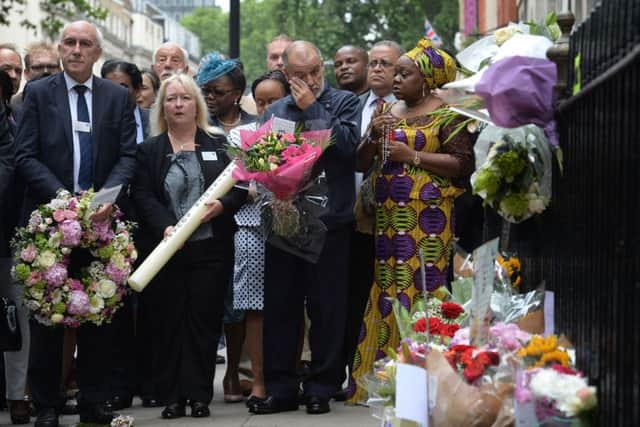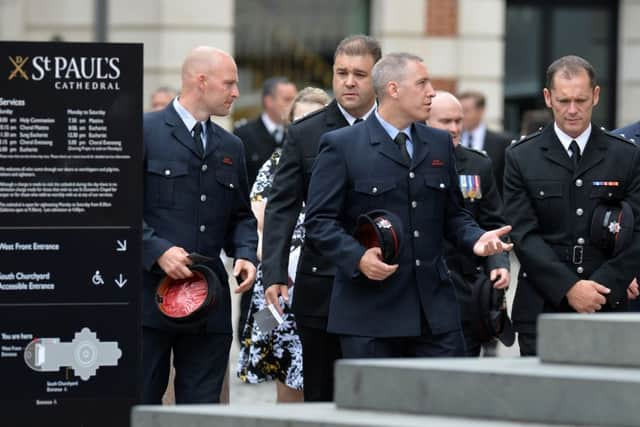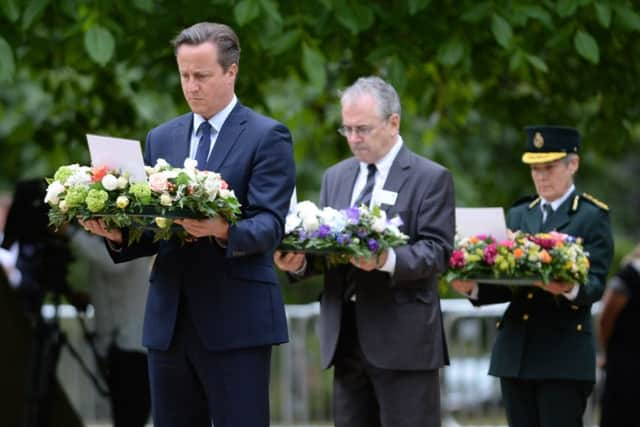Video: Ten years on, Leeds and London fall silent to remember 7/7


A national minute of silence was observed during a service at St Paul’s Cathedral after the names of the 52 people killed were read out.
In Leeds, home to three of the 7/7 bombers, prominent members of the Beeston community joined civic dignitaries, faith leaders and police representatives as a short 7/7 memorial service was held at Leeds Civic Hall.
Advertisement
Hide AdAdvertisement
Hide AdThe invited guests heard from Lord Mayor of Leeds, Coun Judith Chapman and council leader Judith Blake.
Hanif Malik, chief executive of the Hamara Healthy Living Centre in Beeston, also offered his reflections on the anniversary before a minute’s silence was held.
The Lord Mayor said: “Three of the perpetrators came from Leeds, but they nothing of the values of this city – of tolerance, respect and democracy. They did not represent this city 10 years ago and they do not represent it now.”
Coun Blake said the massacre of 38 people, including 30 Britons, in Tunisia last month were a reminder of the “threat and the devastating impact of terrorism on innocent people”.
Advertisement
Hide AdAdvertisement
Hide AdShe said: “Today we in Leeds unite with the rest of the country against terrorism and violence and remember all of those affected by these events.
“We are clear that we will not allow such terrible acts of violence to divert us from our values of tolerance and understanding, values that very much form the basis of this city and its diverse communities.”
Mr Malik said the weeks after 7/7 were “the most surreal and traumatic in my professional working career”.
He added: “The actions of those individuals 10 years ago were not reflective of the community in Leeds and are not reflective of the wider Muslim community. Indeed, I think it’s an irony that, rather than divide, it brought us all together and made us even more resilient.
Advertisement
Hide AdAdvertisement
Hide Ad“Today Beeston and Leeds stand united with the nation in condemning the attacks of July 7, 2005. Ten years on from that atrocity we all vividly recall our shock, our horror, our dismay on discovering that Leeds was linked to those tragic events but we’re also able to recall the very dignified and united response from all sections of our community in ensuring that we remained resolute in not allowing the actions of the few to disrupt the cohesive nature of our home city.”


On Friday a similar period of quiet was held a week on from the Tunisian beach massacre, in which 30 Britons were murdered.
Ten years ago suicide bombers carried out the single worst terrorist atrocity on British soil when they attacked London’s transport system.
Survivors and families of the victims attended a poignant service at St Paul’s.
Advertisement
Hide AdAdvertisement
Hide AdAfter the silence, petals fell from the dome and four candles were lit - one for each of the four blast sites.


Tube trains and buses stopped as the silence was observed, while tennis was delayed at Wimbledon.
Giving an address at the service - attended by dignitaries including David Cameron, Tony Blair and the Duke of York - the Bishop of London Richard Chartres said: “Soon after 7/7 the families and friends of the victims compiled a book of tributes.
“It is a taste of the ocean of pain surrounding the loss of each one of the victims.The tribute book is also very revealing about the character of the London which the bombers attacked.
Advertisement
Hide AdAdvertisement
Hide Ad“The majority of the victims were young. They came from all over the UK and all over the world.”
Earlier, services were held at the exact time when London came under attack ten years ago.
Mr Cameron and Boris Johnson laid wreaths at the permanent memorial to the 52 people killed at 8.50am.


At the same time, victims’ families and survivors gathered at stations affected by the outrage.
Advertisement
Hide AdAdvertisement
Hide AdAt around 8.50am on July 7 2005, there were three almost simultaneous explosions on the Underground.
The Prime Minister and the Mayor of London were among those who paid their respects in a short, sombre ceremony at the memorial in Hyde Park, central London.
In a note attached to his wreath, Mr Cameron wrote: “To the victims of terrorism in London 10 years ago today. We grieve your loss and will honour your memory for ever.”
Speaking before the service, Mr Johnson said the four suicide bombers had “failed in their aim”.
Advertisement
Hide AdAdvertisement
Hide AdHe said the terrorists “didn’t in any way change the fundamentals of London and what makes this city great”, adding: “Indeed, it’s gone from strength to strength in the 10 years since.
“I think most people would say that London has become even more cosmopolitan, even more welcoming.”
In a note on his wreath the Mayor of London wrote: “Ten years may have passed, but London’s memory is undimmed. We honour again today the victims of 7/7. You will live forever in the hearts of the people of this city.”
They were joined at the service by Metropolitan Police Commissioner Sir Bernard Hogan-Howe, transport commissioner Sir Peter Hendy, speaker of the House of Commons John Bercow and acting Labour leader Harriet Harman.
Advertisement
Hide AdAdvertisement
Hide AdAt Edgware Road station, survivors laid flowers and gathered alongside families of victims in the ticket hall for a minute’s silence at 8.50am.
Wreaths and bouquets were laid in front of a plaque which commemorates the attack. A man stood, with his head in his hands, silently crying, as he remembered the victims. A woman walked from the crowd wiping away tears.
Flowers were laid and silences were observed at King’s Cross and Aldgate, which were also affected by the attacks 10 years ago.
A service also took place at Tavistock Square, where a fourth bomb was detonated on a number 30 bus just under an hour after the three blasts on the Underground.
Advertisement
Hide AdAdvertisement
Hide AdA minute’s silence was held, candles were lit and the names of the those killed were read out.
At the Hyde Park memorial later a second service, to be attended by the Duke of Cambridge, will take place featuring music, a series of readings and the laying of flowers.
July 7 2005 had dawned with London still elated from learning the previous day that it had won the 2012 Olympics, but within hours, the country was consumed by horror and grief.
Suicide bombers Mohammed Sidique Khan, 30, Shehzad Tanweer, 22, Hasib Hussain, 18, and Jermaine Lindsay, 19, met at Luton station that morning.
Advertisement
Hide AdAdvertisement
Hide AdThey took a train to King’s Cross in London, hugged and separated to carry out their deadly missions.
Within three minutes of 8.50am, Tanweer detonated his bomb at Aldgate, Khan set his device off at Edgware Road and Lindsay blew himself up between King’s Cross and Russell Square. Hussain detonated his device on a bus at Tavistock Square at 9.47am.
Twenty-six people died in the bombing at Russell Square on the Piccadilly line, six were killed in the blast at Edgware Road on the Circle line, seven in the explosion at Aldgate on the Circle line, and 13 in the bus attack.
READ MORE...